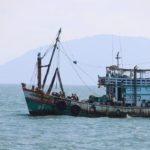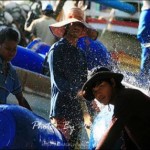
Prime Minister Prayut Chan-o-cha refused last week to delay the implementation of new laws and rules designed to stop illegal, unregulated and unreported (IUU) fishing, despite petitions and threats from over 3,000 trawler owners who have not complied with the new requirements.
On July 1, new rules came into effect requiring fishing vessels to register with the authorities and submit to inspections to ensure they are not using gear that damages the environment. Vessels above 60 tons must have tracking systems to which authorities can monitor their locations. The new laws and regulations were passed to comply with requirements by the European Union and other developed markets that demand seafood imports be certified as not sourced from IUU fishing.
The law requiring owners to register their vessels was passed six months ago, but some estimates say that about half have not yet complied. “If the government extends the deadline, will the E.U. extend its deadline accordingly?” the Prime Minister asked when questioned about cut-off date. The E.U. will decide in August if Thailand has taken serious steps to rein in IUU fishing, and if it concludes Thailand has failed to do so, the E.U. could ban seafood imports from the Kingdom.
The Prime Minister said that Thailand’s fishing industry must raise its standards to international levels to protect valuable marine resources. Thailand’s seafood exports are worth about $2 billion a year, but overexpansion, overfishing and destructive practices threaten the sustainability of the industry as well as the ecology of Thailand’s coastal areas and the seas of Southeast Asia.
“If the trawlers won’t go offshore, so be it, and if they break the law, prosecute them. We have let this problem continue for far too long, because previously we could not act tough against people hit by poverty. But today we follow the law unconditionally,” Prime Minister Prayut said.
Industry statistics show there are 20,000 operators and 53,000 trawlers, of which 33,000 vessels have registered. The Harbor Department has ordered trawlers of more than 60 tons to install a Vessel Monitoring System within three months. The installation of the device costs about $1,300.
Provincial fishing industry associations have said that hundreds of boats have not left port because they fear arrest or being fined for not being in compliance with the new laws. Local media reported that some seafood markets are already running out of supplies and may have to shut down soon.
Some industry analysts and small-scale fishermen say shortages will be short lived because most markets are sourcing farmed fish. Small-scale coastal fishermen support the new regulations and the government’s tough stance. They say that large trawlers routinely violate rules and fish close to shore, using equipment that sweeps the seabed clean and destroys the environment and the livelihoods of small fishermen.




